Description
Rust Programming Complete Master Course: Master System-Level Programming with Rust
Are you ready to unlock the power of Rust Programming Complete Master Course, the system programming language known for its memory safety, concurrency, and performance? Whether you’re a beginner, an experienced developer, or someone transitioning from another language, the Rust Programming Complete Master Course is designed to provide you with a comprehensive learning path. From the fundamentals of the language to advanced topics, this course will give you the skills to write fast, reliable, and secure applications using Rust.
Rust has gained significant popularity in recent years, particularly among developers building systems software, web applications, and performance-critical applications. Its unique memory management model allows for safe concurrency and parallelism without needing a garbage collector. In this course, you’ll dive deep into Rust’s core features, best practices, and how to leverage its strengths for both small projects and large-scale systems.
What You’ll Learn in the Rust Programming Complete Master Course
- Introduction to Rust Programming Language:
- Understand the history and philosophy behind Rust and why it’s becoming the go-to language for system-level programming.
- Install and set up your Rust development environment with Rustup, Cargo, and Rust Playground.
- Learn the Rust toolchain, how to use the compiler, test your code, and manage dependencies with Cargo.
- Getting Started with the Basics of Rust:
- Understand the basic syntax of Rust and how it compares to other languages.
- Write your first Rust program to print “Hello, World!” to the console.
- Learn about variables, data types, and constants in Rust, and how to use them to store and manipulate data.
- Understanding Ownership, Borrowing, and References:
- Rust’s unique approach to memory management is its ownership system. Learn how ownership works, why it’s crucial for memory safety, and how it prevents data races at compile time.
- Explore the concept of borrowing, which allows you to temporarily access data without taking ownership.
- Understand the differences between mutable and immutable references, and how Rust ensures safe concurrent programming.
- Control Flow:
- Learn how to handle decision-making in Rust using if statements, loops, and match expressions.
- Understand how match is used to pattern match on enums, data structures, and more, making Rust’s flow control more powerful and flexible than traditional switch/case statements in other languages.
- Functions and Error Handling:
- Write functions in Rust, learn about function parameters, and understand Rust’s powerful function return types.
- Learn how Rust handles errors using the Result and Option types instead of exceptions. You’ll get comfortable with the ? operator, pattern matching, and unwrap() for handling errors in a robust, safe way.
- Understanding Structs, Enums, and Pattern Matching:
- Learn about structs to define custom data types in Rust and how to use them effectively.
- Dive into enums, which allow you to define types that can represent multiple different variants (e.g.,
SomeorNoneforOption). - Learn how to leverage pattern matching with match, a Rust feature that provides a powerful way to destructure enums and other data types for safe handling.
- Collections and Memory Management:
- Understand Rust’s collection types, such as vectors, strings, hash maps, and arrays, and when to use each.
- Learn how Rust’s memory model and ownership system work together to ensure memory safety without needing a garbage collector.
- Explore advanced memory management techniques, such as the Rc (Reference Counted) and Arc (Atomic Reference Counted) smart pointers, for safe memory usage in concurrent contexts.
- Concurrency and Parallelism:
- Discover Rust’s approach to concurrency and parallelism using threads and async programming.
- Learn how to safely share data across threads using channels, mutexes, and atomic operations.
- Understand the async/await syntax for writing asynchronous code and how Rust ensures thread safety when working with concurrency.
- Traits and Generics:
- Learn about traits in Rust, which define shared behavior for types, and how to implement them for custom types.
- Master generics to write flexible, reusable code that works with multiple data types.
- Understand trait bounds and how they help you control the types that can be used with generics.
- Modules and Packages:
- Learn how to organize your code into modules and packages for better readability and maintainability.
- Understand how to use Cargo to create libraries and applications, manage dependencies, and build your projects in an efficient way.
- Advanced Rust Concepts:
- Dive deeper into more advanced Rust topics such as unsafe code, lifetime annotations, and advanced patterns.
- Learn how to work with unsafe code to handle low-level memory management when necessary, while still keeping the guarantees of Rust’s safety principles.
- Understand lifetime annotations and how they help Rust track and ensure memory safety during compilation.
- Building Real-World Projects:
- Put your skills to the test by building real-world projects. You’ll develop:
- A CLI application that interacts with the file system and processes user input.
- A multi-threaded server that handles concurrent connections.
- A web application using async Rust and a web framework like Rocket or Actix.
- Learn how to test your code, ensure it’s efficient, and deploy it for production.
- Put your skills to the test by building real-world projects. You’ll develop:
- Testing and Debugging in Rust:
- Learn how to use Rust’s built-in testing framework to write unit and integration tests for your code.
- Understand how to debug your Rust applications using println!, logging, and Rust’s debugging tools.
- Discover how to optimize your Rust code to improve performance using profiling tools and best practices.
- Deploying and Packaging Rust Applications:
- Learn how to build and package your Rust applications for deployment on different platforms (Linux, macOS, Windows).
- Understand the steps for cross-compilation to target different architectures.
- Explore Docker for containerizing Rust applications, making them portable and easy to deploy across environments.
Why Choose Rust Programming Complete Master Course?
- Comprehensive Curriculum: This course covers everything from the basics to advanced topics in Rust, ensuring you get a thorough understanding of the language and its features.
- Hands-On Learning: Build real-world projects throughout the course that help you apply the concepts in practical scenarios.
- Focus on Safety and Performance: Learn how to write safe, fast, and efficient code with Rust’s memory safety and concurrency guarantees.
- Up-to-Date Content: Stay current with the latest features and best practices in Rust, ensuring you’re prepared for the modern development landscape.
- Expert Instructor: Learn from an experienced instructor who will guide you through each concept with clear explanations and practical examples.
By the end of the Rust Programming Complete Master Course, you will have the skills needed to become a proficient Rust developer. You’ll be capable of writing high-performance, safe, and concurrent code that can be used in a wide variety of applications, from system-level programming to web development. Whether you want to build a server, develop a web app, or create a command-line tool, Rust provides the tools and features you need to build reliable and efficient software. Start your journey with Rust today and become an expert in one of the most powerful and efficient programming languages available.
Also Checkout
200+ Stock Market E-books
Also Checkout – https://digitalstock.co.in/product/200-stock-market-ebooks/
Official Contact – https://coderedsoftwares.com/contact


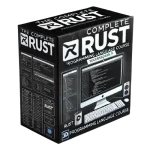
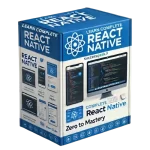

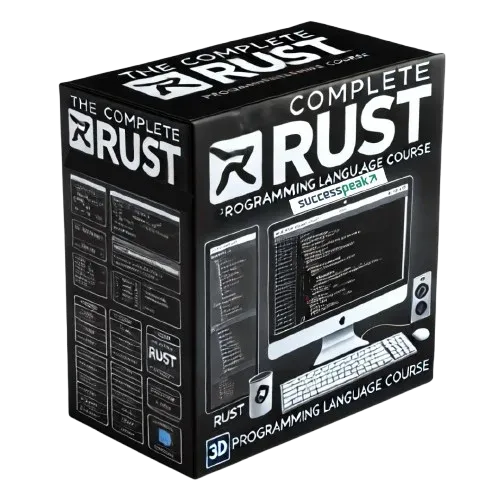
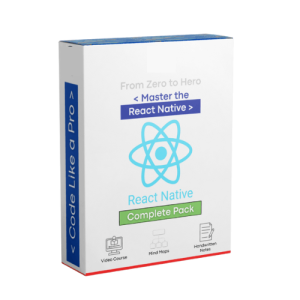


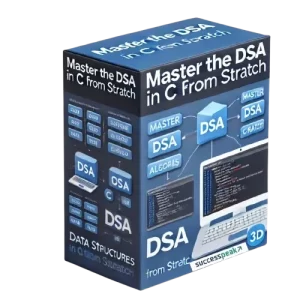


Reviews
There are no reviews yet.